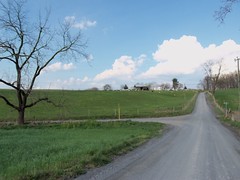How fortunate that it is Musing Mondays day at Should Be Reading…I’m ready to muse on my last read: The Sunne in Splendour by Sharon Kay Penman. It is billed as the story of Richard III but because it covers most of his life and since his reign was short, the book also portrays the monarchy of Edward IV, during whose reign most of the major battles of the Wars of the Roses were fought.
Penman portrays a Richard who is nothing like the murderous hunchback of Shakespeare and other popular tales. He is sensitive and just, willing to forgive and forget even to the point of the final betrayal at Bosworth Field. And, Penman takes the side of those who blame the Duke of Buckingham for killing Edward’s two sons, the famous Princes in the Tower. She believes that Richard was slandered by history as the Tudors worked to strengthen their somewhat tenuous hold on the English crown, a belief shared by the Richard III Society.
Perhaps the biggest irony is that, with the fall of Richard, the House of Plantagenet was gone forever, with both red and white roses wilting on the vine. It was the Tudors who would move into the limelight, and with such stars as Henry VIII and Elizabeth I, they easily became the more well known family.
But what has me musing are the middle ages themselves: these deeply religious people who were willing to do anything to gain power as that meant wealth and security in a time when most people lived in abject poverty. Even when gaining power meant the sure death of your rivals either on the battlefield or later on the execution ground or perhaps in a prison cell. Deeply religious people who had no problem with recognizing children born out of wedlock but when even a “plight troth”–a pledge of eventual marriage–could make a future marriage illegal, as was thought to be the case with Edward IV. Yet, getting dispensation to annul a marriage or marry a cousin was often quite easy and, if you couldn’t, you could just start a new church that did allow it ala Henry VIII. In fact, almost anything could be justified based on religious belief since the King was still seen as divinely endowed. Sanctuaries are violated with swords, whole towns are pillaged after battles, and women and children are often not spared.
And then I started musing about what has changed: at least in Western style democracies, you generally don’t die when you lose an election. (Of course, the very fact of elections means we’ve moved pretty far along here.) In fact, in the United States, you benefit handsomely by going on book and lecture tours and making lots of money along with your cronies who, in the past, would have died with you or had a last minute change of heart when they saw how the battle was going, like the Duke of Northumberland and the Stanleys at the Battle of Bosworth. But killing your rivals certainly goes on in other parts of the world with alarming frequency. And, if anything, we are more prudish about children born without benefit of marriage, at least if the covers of the grocery store tabloids are to be believed. Rulers of earlier times often recognized these children and brought them to court or at least provided good lives for them although they, of course, weren’t good enough to be considered heirs to the throne.
And, even as Penman makes the point that the winners write history, access to a world wide audience on the Internet means that the losers can at least have a voice, even it is a ghostly one echoing from the past. My last musing is about Shakespeare, for whom we have much to thank for our modern perceptions of Richard: what was his motivation in portraying such an evil man? Was he something of mouthpiece for the Tudors, writing under their tutelage? Or was it simply stagecraft, combining history and tragedy to tell a compelling story that would not have been as entertaining without the evil Richard?



